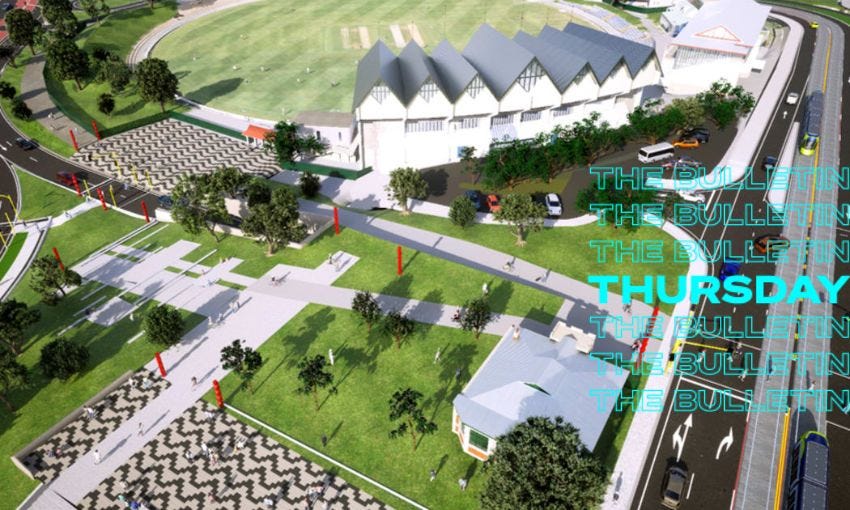Getting Wellington moving
Announced as a once-in-generation opportunity, the long-awaited Let’s get Wellington moving plan prompts a range of reactions
Mōrena and welcome to The Bulletin for Thursday, June 30, by Anna Rawhiti-Connell. Presented in partnership with Z Energy.
In today’s edition: the prime minister’s speech at NATO; resident visa application numbers exceed estimates; the communities most at risk of being victims of crime; but first, the plan to get Wellington moving.
Illustration showing roading around the Basin Reserve, no longer to be the Southern Hemisphere’s largest roundabout. (Photo: Supplied / LGWM)
“Once-in-a-generation opportunity”
I am in the capital this fine morning so thought I would take a look at the plan to get Wellington moving. I absolutely will not gripe about the airport bus situation which I believe is due to be rectified from tomorrow. Yesterday the government announced its preferred plan for the overhaul of how Wellingtonians get around. It was billed as a once-in-a-generation opportunity to shape Wellington’s future by finance and infrastructure minister, Grant Robertson. The government has backed light rail from the city to Island Bay and a new tunnel through Mt Victoria. Overall, the plan is estimated to cost $7.6b and slated for completion in the 2030s. Wellington city council and Greater Wellington regional council now have to choose their preferred option before more detailed planning can begin.
Mode shift
Wellingtonians have waited a long time for this. Let’s get Wellington moving is a joint initiative created in 2015 involving Wellington city council, Greater Wellington regional council and Waka Kotahi NZ transport agency. It hit problems along the way, with the project deemed at risk of failure in March last year. Stuff’s Kate Green has written this very good overview of the initiative. The project’s main aim is mode shift - getting people cycling, walking and taking public transport. The Dominion Post has been championing and explaining the concept with a regular series. You can read editor Anna Fifield’s introduction here.
So what’s been the reaction?
So far, from local and central government figures, I’d go with unsurprisingly “mixed”. Stuff’s Luke Malpass describes the arguments for and against as a retreat into various ideological silos. Mayor Andy Foster applauded the announcement as a “massive” day for the capital. The Dominion Post is running that line on the front page of the paper this morning. The Green party welcomed portions of it but transport spokesperson Julie Anne Genter said the government’s preferred option is "not the best for the climate overall" citing the tunnels as “high-carbon and high-cost”. As RNZ’s Kirsty Frame reports, the government is yet to complete an assessment of the climate implications of the policy. National MP Nicola Willis criticised the announcement for being just that, an announcement, saying it was hard to get excited because as yet there was no business case, no funding agreement and no plan to start construction until 2028.
New contender for largest roundabout in Southern hemisphere?
Naturally the first question we had in the Spinoff office was “will people still toot in the new tunnel?” The old Mt Victoria tunnel would be converted into a walking and cycling-only route according to the plan. I recently drove to Wellington airport in torrential rain and observed the bottleneck the current Mt Victoria tunnel creates, barely squeaking onto the plane in time. The proposed second tunnel will have four lanes - one lane each way for public transport and one for private vehicles. There are also proposed changes to roading around the Basin Reserve, meaning there will be a new contender for the title of largest roundabout in the Southern hemisphere. Bit of a throwback but in 2013, the roundabout caught the eye of the United Kingdom roundabout appreciation society and it featured the Basin Reserve in a roundabouts of the world calendar. The National library has a copy.
The third episode in The Spinoff’s new podcast series Going Global, is out now. Co-hosts Ethique’s Brianne West and Business is Boring’s Simon Pound talk to Rachel Taulelei, Māori business leader and co-founder of design and brand strategy firm Oho. Taulelei’s connection to her Māoritanga has been vital in her career, from founding sustainable fishery Yellow Brick Road, to being chief executive officer of food and beverage company Kono exporting to more than 40 countries worldwide. Listen to Going Global, produced in partnership with New Zealand Trade and Enterprise, on The Spinoff Podcast Network. (Sponsored)
Prime minister uses NATO summit speech to call for nuclear disarmament
Jacinda Ardern also urged NATO members to "resist the temptation to simplify the increasingly complex world in which we live" and called out China for its recent challenging of international norms and Russia for its information warfare in the Pacific. Speaking to New Zealand’s nuclear free status, Ardern said “Some may observe this status and assume us to have the naive privilege of such a position. I would argue, the world can’t afford anything less.” Ardern opened the speech with a clear statement articulating that New Zealand did not want to expand its military alliances. A full transcript of the speech is here. NATO leaders have announced a new “strategic concept” in response to Russia’s war against Ukraine, describing Moscow as “the most significant and direct threat to allies’ security and stability”. Sweden and Finland have also been invited to become members of NATO, a move condemned by Russia. Ardern heads to Brussels next and has reiterated that she is willing to leave Europe without a free trade agreement if there wasn’t “commercially meaningful access for our exporters”.
Residence visa application numbers exceed government forecasts
As RNZ’s Gill Bonnett reports, the number of migrants who have applied for residence under the one-off settlement visa has now surpassed 200,000 people. The government initially forecasted that 165,000 people would be eligible across 110,000 applications. As Bonnett writes, numbers have exceeded estimates because the average number of people in each application was underestimated by Immigration New Zealand. Since December 2021, 57,000 people have been approved for residence and about 100 have been declined. Meanwhile there are reports that health workers in the US are making enquiries about moving to New Zealand in the wake of the Supreme Court’s decision to overturn Roe V Wade.
A vital message from The Spinoff’s publisher, Duncan Greive:
If you’re reading this, you’re hopefully getting value out of The Spinoff. Yet like many publishers, we’ve suffered a significant drop in members, despite our costs continuing to increase. On one level I understand why our membership has dropped away. As the cost of living has reached new heights and the pandemic has become less of an urgent news event and more of a part of day-to-day life, it’s totally normal to feel like you don’t need to support your local media organisation.
The promise we’re making to you is that we’re actually better suited to times like this than the pandemic itself. Of course we will continue to write about Covid-19 and the many effects it’s having on society, but our plan now is to return to something more of what made us, which is coverage of culture, politics, business, te ao Māori and more with heart and humour.
But we can’t do it without you. We need your support more than we ever have. So please, if you can, click here to support The Spinoff by becoming a member today.
2% percent of adults experience 39% of all crime in New Zealand
This is one of the trends identified in the ministry of justice's fourth New Zealand crime and victims Survey. Those people are being victimised multiple times. As reported by RNZ’s Jake McKee, the survey also showed about 29% of adults were victims of crime once or more during 2021. Adults with disabilities were 55% more likely to be victimised than the average New Zealander, and half of non-heterosexual adults were victims of crime in 2021 compared to 29% of the average population. Earlier this month RNZ’s Anneke Smith looked at a deliberate strategy to keep victim support costs within budget which was excluding crime victims from accessing the Victim Assistance Scheme (VAS). Just 4% of eligible victims are getting the financial support they're entitled to through the scheme. New justice minister Kiritapu Allan has pledged to bring "a very victim-centric" approach to the role.
Got some feedback about The Bulletin, or anything in the news? Get in touch with me at thebulletin@thespinoff.co.nz
Legal, smokable cannabis flower – weed, in other words – is now available to be prescribed by New Zealand doctors. Who knew? Chris Schulz finds out more. Jacob Flanagan explains how one council meeting derailed Wellington’s housing densification plans. Catherine Woulfe pays tribute to The Sapling, the website giving New Zealand children's literature a home. Tara Ward tunes in to watch the new season of Eat Well For Less NZ avoid the elephant in the room. Madeleine Chapman tries the new Coke Zero Sugar, which – surprise – is virtually identical to the old Coke No Sugar.
Fees making sport participation prohibitive
A Wellington-based lobby group has said the fees charged by councils in the region for the use of sports grounds and facilities are making the cost of participating in sport prohibitive. Affordable sports for Greater Wellington is made up of the regional hockey, rugby, basketball, football and cricket bodies, plus College Sport Wellington. It’s asking for councils to come to the table to discuss the issue and review facility charges. A Sport New Zealand survey cited a 7% drop in weekly sport participation among young people in high deprivation areas between 2019 and 2021. Participation stayed stable in more affluent areas.
The Republic of Whangamōmona and other micronations
Presidents of the Republic of Whangamōmona have included Billy Gumboot (a goat) and a poodle called Tai who controversially resigned after an assassination attempt. Micronations aren't real countries by definition, more eccentric mini-states. University of Technology Sydney lecturer Harry Hobbs has co-written a book exploring the phenomenon of people trying to secede and create their own countries. All this glorious detail and more is covered in this RNZ feature and an accompanying interview with Hobbs.












As someone who lived in Wellington for many years I wonder what planet the Govt is on? Have they been outside? Walking, biking is if little value, attraction or likelihood apart from the masochists. Buses are a microbial cesspit. Good luck